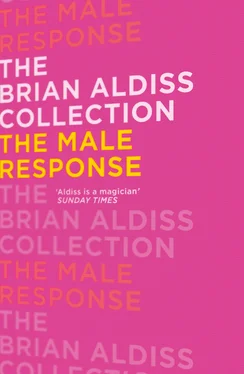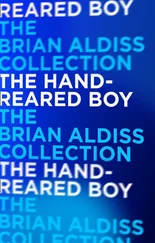Many people were about, mostly negro, the variety of their features suggesting that several races mingled here; a number of Indians could be seen, carrying umbrellas and looking important. Once Soames thought he saw a European, but the man vanished into a shop. A few American cars were in evidence, outnumbered by pariah dogs by ten to one.
The rickshaw made its way slowly through the market place, its owner adding his voice to the babble of the crowd; they swerved down a wide road and came unexpectedly on the Presidential palace, from which a crimson, scarlet and black flag flew. Guards at the gate waved to the vehicle as it passed them and turned up the drive.
The palace looked like one of those great grey barracks the British used to build with such tedious frequency in Central India, but its gauntness was relieved by a riot of creeper which attempted to swarm up every balustrade and into every window – something never permissible in Central India, for fear the local women took advantage of this unorthodox staircase to accost the troops. From the tessellations which crowned the building floated a great brown banner bearing a word that, in these unexpected surroundings, took on a resonant ambiguity: DUNLOP. On the wide steps below, flecked by the droppings of a thousand brightly coloured birds which flitted ceaselessly in and out of the creeper, ten black soldiers in white uniforms stood with rifles at the slope, open umbrellas attached to the rifles in place of bayonets, lest they should become flecked like the steps on which they stood.
This impressive scene was marred only by a discarded bath full of Coca-Cola bottles and rainwater lying by the drive, from which a dog drank in insolent disregard of the nearby soldiery.
When Soames and Timpleton dismounted from their chariot, their guide paid off the owner and led them quickly up the steps. They proceeded through an archway and down a corridor to a small room, the door of which the guide opened for them.
‘Please wait here; someone else come see you soon, gentlemen.’
‘This is like a dentist’s waiting room only more so,’ Timpleton remarked, as the guide left.
On the benches round the room two men were already sitting, as far apart from each other as possible; Soames and Timpleton selected an intermediate position and eyed the magazines piled on a central table. The only English language offerings were two copies of Drum and a Radio Times for week ending 5th March 1955.
Soames had no sooner settled down to scratch a cluster of tiny, red-hot tents erected close to his navel by an exploring insect party the previous night, when one of the two waiting men shuffled over and addressed him.
‘Is it my pleasure and fortune to be soliciting the two flying British who are transporting the magical scientific box hitherwards?’ he enquired, in an English so elaborately broken that the two flying British were left rather in the air. ‘Possibility that it can be no others makes a double delight.’
Always anxious not to make an inadequate response, Soames rose, bowed awkwardly, and said, ‘How do you do? This is my colleague Mr Edward Timpleton: my name is Soames Noyes.’
The stranger received these names with relish, repeating them to himself with his fingers on his lips, as if to get the feel as well as the sound of them.
‘So!’ he said. ‘No meeting for me can be more too delightful,’ and he announced himself with a flourish as José Blencimonti Soares. This done, he shook hands warmly and protractedly with both Soames and Timpleton, producing a bandana after the operation, on which he thoroughly mopped his podgy hands.
He was a dumpy man in his fifties, dressed in a tropical suit, from the starched lapels of which burst a large flower like a geranium, its brightness in striking contrast to the grey jowls which brushed it during excessive outbursts of expressiveness.
‘I am for long resident in Umbalathorp, sirs,’ he said, ‘and delighted to show you its attractions, if of convenience. I have the pleasure and fortune to be leader of local Portuguese community. We see few Europeans here: last one was an American called Mr John Gunther, and brand-new faces like yours always welcome, also pleasantness of visit very much agreeable. My residence, my wife, my food and my beautiful daughter Maria are open to you eternally.’
Ignoring the sly kick this last remark prompted Timpleton to give him, Soames offered his thanks and enquired innocently if there were any Englishmen in the town. At this Soares’ pudgy face clouded like a peke’s with toothache, and he said, ‘Only one outcast family, señor, the Pickets, at whom you should be advised to steer clearly.’
Timpleton waved him nearer with two beckoning fingers.
‘Here, Mr Soares, give us the lowdown on this dump. Never mind the English – what we want to know is, how about the women?’
The Portuguese laughed. Soames recognised that laugh; it had frequently been described in the literature of his boyhood as ‘a greasy chuckle’.
‘So you are what you call an old dirty man,’ he said, nodding approvingly. ‘In all the world is women to be had, and in Goya many good variety, what colour or size to fit the individual whimsy. Only one thing to be warned is of dreaded akkabaksi pox.’
‘What the deuce is akkabaksi pox?’ inquired Soames, alarmed and interested.
Soares rolled yellow eyeballs and puffed out yellow-grey cheeks expressively.
‘Akkabaksi pox is very nasty local disease, misters, I telling you, cause much misery in the bazaar.’
‘What is it?’
‘Is caught from dirty woman, pfafft, just like that. After two days catching it, the victim finds hugest black scabs of matter at point of contact. Then he will pack up three days ration for food and water and will march off into the jungle.’
‘What for?’ Timpleton asked. He had turned an unsuitable shade of grey round the jowls.
‘Is finished, sir,’ Soares replied simply. ‘Has no cure. Not Western medicine or witch doctor Dumayami can cure dreaded akkabaksi pox. In three four days, all the bones turn to jelly, the stomach will explode. Pfafft! Is finish!’
‘Good God!’ the two Englishmen exclaimed in chorus.
Switching his mood and expression from supreme dejection to extreme elation, Soares leant over and smacked them on the knee.
‘But is no need for worry for you. Trust to me who can be your friend. Always I sell you good clean girl. Come to old Soares for priceless virgin flesh. Guaranteed no disease. Fresh as a sea smell.’
Changing this subject abruptly, he asked, ‘Now you have an auditorium with President Landor, yes?’
‘I suppose so,’ Soames said. ‘The arrangements seem a bit vague. We only got here last night, you know.’
‘Any difficulties, come at a run to me, I insist,’ Soares said, smiling winningly. ‘Because I do much trade in Goya. I have pleasure and honour to hold ear of President.’ He tapped his heart impressively as if he kept this presidential appendage in his breast-pocket.
‘We’re going to live in the palace,’ said Timpleton. ‘Is it OK here? Give us the lowdown.’
‘Hunky dory,’ Soares told him unexpectedly. ‘All plumbing throughout by courtesy of José Soares and his company. All business here, my business.’
A palace guard entered and spoke briefly in Goyese to Soares.
‘Now is time for my auditorium,’ Soares said. ‘Gentlemen, we are bounders to meet again.’ Bowing, smiling, nodding, wagging one finger above his head, he left with the guard.
Half an hour later, the same guard appeared and beckoned to the two Englishmen. As they left, Soames glanced back at the other occupant of the waiting room. He was an ancient, white-haired negro with a battered cardboard box on his knee. Not once had he stirred since Soames had been there. Perhaps, like the 1955 Radio Times , he went with the room.
Читать дальше












